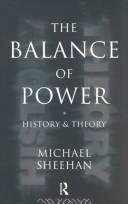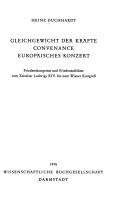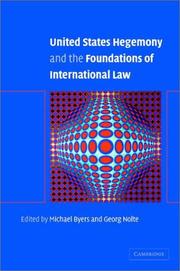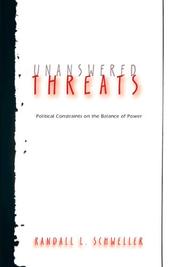| Listing 1 - 8 of 8 |
Sort by
|

ISBN: 0415119316 0415119308 9780415119313 Year: 1996 Publisher: London Routledge
Abstract | Keywords | Export | Availability | Bookmark
 Loading...
Loading...Choose an application
- Reference Manager
- EndNote
- RefWorks (Direct export to RefWorks)
International relations. Foreign policy --- Balance of power --- International relations --- Equilibre des puissances --- Relations internationales --- History --- Philosophy. --- Histoire --- Philosophie --- Philosophy --- #SBIB:327.5H00 --- #SBIB:327.6H00 --- #SBIB:AANKOOP --- Strategie en vredesonderzoek: algemeen --- Internationale en diplomatieke relaties: algemeen --- History. --- Balance of power - History. --- Power, Balance of --- Power politics --- Political realism --- Balance of power - History --- International relations - Philosophy
Book
ISBN: 9780415475471 9780415724265 9780203127209 9781136461033 9781136461071 9781136461088 0415724260 0415475473 020312720X Year: 2012 Publisher: London : Routledge,
Abstract | Keywords | Export | Availability | Bookmark
 Loading...
Loading...Choose an application
- Reference Manager
- EndNote
- RefWorks (Direct export to RefWorks)
International relations --- Balance of power --- History --- Communauté internationale --- Relations internationales --- Coopération internationale --- 21st century --- Communauté internationale. --- Relations internationales. --- Coopération internationale. --- International relations - History - 21st century --- Balance of power - History - 21st century
Book
ISBN: 9782738147233 2738147232 2738147232 9782738147233 Year: 2019 Publisher: Paris : Odile Jacob,
Abstract | Keywords | Export | Availability | Bookmark
 Loading...
Loading...Choose an application
- Reference Manager
- EndNote
- RefWorks (Direct export to RefWorks)
L'humiliation est devenue l'ordinaire des relations internationales. Rabaisser un Etat, le mettre sous tutelle, le tenir à l'écart des lieux de décision, stigmatiser ses dirigeants : autant de pratiques diplomatiques qui se sont banalisées au fil du temps. De quoi ces diplomaties de l'humiliation sont-elles révélatrices ? Les réactions des humiliés - de la conférence de Bandung en 1955 aux Printemps arabes - n'invitent-elles pas à une autre gouvernance ? Convoquant l'histoire et la sociologie politique, Bertrand Badie remonte aux sources de l'humiliation : les conquêtes occidentales du XIXe siècle, la montée des revanchismes dans l'entre-deux-guerres, une décolonisation mal maîtrisée. Il montre que sa banalisation consacre l'émergence dramatique des opinions publiques et des sociétés sur la scène internationale, mais qu'elle trahit aussi l'inadaptation des vieilles puissances et de leurs diplomaties à un monde de plus en plus globalisé. Dès lors, il devient urgent de reconstruire un ordre international dans lequel les humiliés et leurs sociétés trouveront toute leur place. La montée des populismes et l'élection de Trump en 2016, le durcissement des gouvernements autoritaires d'Erdogan et de Poutine ou les provocations de la Corée du Nord confirment le rôle structurel de l'humiliation dans les relations internationales, avec cette inversion inquiétante : l'humilié d'hier devient aussi l'humiliateur d'aujourd'hui.
International relations - History - 20th century --- International relations - History - 21st century --- Balance of power - History - 20th century --- Diplomacy - History - 20th century --- Relations internationales --- Humiliation --- Équilibre des puissances --- Aspect psychologique. --- Aspect politique. --- International relations --- Balance of power --- Diplomacy

ISBN: 3534063988 9783534063987 Year: 1976 Volume: 56 Publisher: Darmstadt Wissenschaftliche Buchgesellschaft
Abstract | Keywords | Export | Availability | Bookmark
 Loading...
Loading...Choose an application
- Reference Manager
- EndNote
- RefWorks (Direct export to RefWorks)
Peace --- Peace treaties --- Balance of power --- Congresses --- History --- -Peace --- -Peace treaties --- -Treaties of peace --- Treaties --- Coexistence, Peaceful --- Peaceful coexistence --- International relations --- Disarmament --- Peace-building --- Security, International --- War --- Power, Balance of --- Power politics --- Political realism --- -History --- History. --- Treaties of peace --- Congresses&delete& --- Peace - Congresses - History --- Peace treaties - History --- Balance of power - History

ISBN: 0521819490 0521050863 110713580X 0511179057 0511061579 0511326033 0511055242 0511494157 1280430605 1139148796 0511070039 9780521819497 9780511061578 9780511179051 9780511494154 9780511070037 9780511055249 9780521050869 9781280430602 9781139148795 9780511326035 Year: 2003 Publisher: Cambridge, UK New York Cambridge University Press
Abstract | Keywords | Export | Availability | Bookmark
 Loading...
Loading...Choose an application
- Reference Manager
- EndNote
- RefWorks (Direct export to RefWorks)
Successive hegemonic powers have shaped the foundations of international law. This book examines whether the predominance of the United States is leading to foundational change in the international legal system. A range of leading scholars in international law and international relations consider six foundational areas that could be undergoing change, including international community, sovereign equality, the law governing the use of force, and compliance. The authors demonstrate that the effects of US predominance on the foundations of international law are real, but also intensely complex. This complexity is due, in part, to a multitude of actors exercising influential roles. And it is also due to the continued vitality and remaining functionality of the international legal system itself. This system limits the influence of individual states, while stretching and bending in response to the changing geopolitics of our time.
Balance of power --- -International law --- -Law of nations --- Nations, Law of --- Public international law --- Law --- Power, Balance of --- Power politics --- International relations --- Political realism --- History --- United States --- Foreign relations. --- International law --- History. --- Droit international --- Equilibre des puissances --- Histoire --- Etats-Unis --- Foreign relations --- Relations extérieures --- Law of nations --- General and Others --- International law - History. --- International law - United States - History. --- Balance of power - History.

ISBN: 1282964976 9786612964978 1400837855 9781400837854 9780691136462 0691136467 0691124256 9780691124254 0691124256 Year: 2010 Publisher: Princeton, NJ
Abstract | Keywords | Export | Availability | Bookmark
 Loading...
Loading...Choose an application
- Reference Manager
- EndNote
- RefWorks (Direct export to RefWorks)
Why have states throughout history regularly underestimated dangers to their survival? Why have some states been able to mobilize their material resources effectively to balance against threats, while others have not been able to do so? The phenomenon of "underbalancing" is a common but woefully underexamined behavior in international politics. Underbalancing occurs when states fail to recognize dangerous threats, choose not to react to them, or respond in paltry and imprudent ways. It is a response that directly contradicts the core prediction of structural realism's balance-of-power theory--that states motivated to survive as autonomous entities are coherent actors that, when confronted by dangerous threats, act to restore the disrupted balance by creating alliances or increasing their military capabilities, or, in some cases, a combination of both. Consistent with the new wave of neoclassical realist research, Unanswered Threats offers a theory of underbalancing based on four domestic-level variables--elite consensus, elite cohesion, social cohesion, and regime/government vulnerability--that channel, mediate, and redirect policy responses to external pressures and incentives. The theory yields five causal schemes for underbalancing behavior, which are tested against the cases of interwar Britain and France, France from 1877 to 1913, and the War of the Triple Alliance (1864-1870) that pitted tiny Paraguay against Brazil, Argentina, and Uruguay. Randall Schweller concludes that those most likely to underbalance are incoherent, fragmented states whose elites are constrained by political considerations.
Balance of power --- Power, Balance of --- Power politics --- International relations --- Political realism --- History. --- #SBIB:327.6H00 --- #SBIB:93H3 --- History --- Internationale en diplomatieke relaties: algemeen --- Thematische geschiedenis --- Equilibre des puissances --- Histoire --- Balance of power - History --- Balance of power - Case studies --- Equilibre des puissances - Histoire --- Equilibre des puissances - Cas, Etudes de
Book
ISBN: 9782251381305 2251381309 Year: 2015 Publisher: Paris : Les Belles lettres,
Abstract | Keywords | Export | Availability | Bookmark
 Loading...
Loading...Choose an application
- Reference Manager
- EndNote
- RefWorks (Direct export to RefWorks)
Dans ce nouvel opus, Adam Tooze décrit et analyse les changements essentiels survenus pendant et après la Première Guerre mondiale - le plus important, qui constitue le thème principal du livre, étant l'accession des Etats-Unis à une position de suprématie économique, politique et morale sans précédent. Première économie mondiale, l'Amérique devient à partir de 1916 le "banquier" de la guerre, animée, selon l'auteur, par le dessein très clair d'exercer son hégémonie financière sur les pays de l'Entente devenus dépendants de ses prêts. Avec la disparition de ses empires naguère dominants au profit du grand empire américain et de sa prééminence économique et militaire, l'Europe se trouve ravalée au rang de "province" ; en 1918, le Président Wilson est en mesure de jouer le rôle d'arbitre du nouvel ordre mondial auquel il aspirait en imposant la paix au monde entier, avec son projet fétiche et idéaliste de Société des Nations. Pourtant, quand vient le moment d'endosser concrètement sa position de leader mondial, l'Amérique recule : le Congrès américain ne ratifie pas le traité de paix ; Washington n'intègre pas la Société des Nations. Selon l'auteur, les Etats-Unis n'ont pas encore atteint la maturité démocratique nécessaire pour assumer leurs responsabilités. Il faudra attendre une génération, sous les présidences de Roosevelt et Truman, pour que ce soit le cas. Une fois le traité de Versailles signé par l'Allemagne, une seconde guerre était-elle inévitable ? L'insistance des Alliés pour obtenir des réparations (et celle des Etats-Unis pour obtenir le remboursement des dettes de guerre) contribua-t-elle à l'échec de la République de Weimar ? Deux questions essentielles auxquelles l'auteur répond par la négative. A la fin des années 20, les Européens étaient en chemin vers un retour à la normalité, et des hommes d'Etat tels G. Stresemann en Allemagne et A. Briand en France travaillaient patiemment à une consolidation des liens qui déboucherait sur la CEE dans les années 50. Mais alors qu'en 1928, Hitler et Trotski désespéraient de voir un jour la chute de l'ordre capitaliste, l'année suivante, la faillite de Wall Street déclenchera une nouvelle série d'événements qui entraîneront la sortie de la Grande-Bretagne de l'étalon-or en 1931 et plongeront l'Allemagne dans le chaos économique et politique. Ceci étant, Adam Tooze récuse la vision, défendue par certains historiens modernes, de l'entre-deux-guerres comme d'une période où l'Europe renoua avec ses démons passés et rejeta le libéralisme démocratique au profit de l'autocratie et du fascisme. Pour lui, les principales nations d'Europe et d'Asie luttèrent alors pour s'adapter à la modernité et à la géopolitique moderne, s'acheminant tant bien que mal vers la création d'une structure qui garantirait la sécurité internationale - sans parvenir, au final, à couper sur le plan financier, le cordon avec Washington. De manière générale, l'auteur n'hésite d'ailleurs pas à s'inscrire en faux par rapport aux récits conventionnels de la période (il montre aussi que ce n'est pas le traité de Versailles mais celui de Washington, en 1922, qui scella le nouvel ordre mondial régi par la suprématie des Etats-Unis).
Economic history --- World War, 1914-1918 --- Histoire économique --- Première guerre mondiale --- Economic aspects --- Aspect économique --- Guerre mondiale (1914-1918) --- Relations internationales --- Paix --- Histoire économique --- Première guerre mondiale --- Aspect économique --- Paix. --- Communauté internationale --- World War, 1914-1918 - Social aspects --- World politics - 1919-1932 --- Balance of power - History - 20th century --- Economic history - 1918-1945 --- International relations - History - 20th century --- World War, 1914-1918 - Economic aspects --- World War, 1914-1918 - United States --- World War, 1914-1918 - Influence --- Traités de paix --- Économie politique et politique --- Reconstruction d'après-guerre (1re guerre mondiale) --- Wilson, Woodrow, - 1856-1924 --- Wilson, Woodrow, 1856-1924 --- World politics --- Balance of power --- International relations
Book
ISSN: 16106040 ISBN: 9783465043690 3465043693 Year: 2021 Volume: 320 Publisher: Frankfurt am Main Vittorio Klostermann
Abstract | Keywords | Export | Availability | Bookmark
 Loading...
Loading...Choose an application
- Reference Manager
- EndNote
- RefWorks (Direct export to RefWorks)
Der Begriff "Staat" in seinem modernen Verständnis wurde im deutschsprachigen Reich nicht mit Bezug auf das frühneuzeitliche Alte Reich als Ganzes und erst recht nicht auf die Konsolidierung fürstlicher Macht über Land und Leute gemünzt. Vielmehr stand seine Genese im Zusammenhang mit den erbitterten Konflikten zwischen entstehenden Landständen und Fürsten angesichts der Verwüstungen des Dreißigjährigen Krieges. Die zeitgenössische und auf Luther zurückgehende Polemik gegen verbrecherische Fürsten aufnehmend, sollte Seckendorffs "Teutscher Fürstenstaat" (1656) als vermeintlich bis weit ins Mittelalter zurückreichende Einheit aus Land, Leuten und Gesetzen seine Bewohner durch eigene Rechtsordnung und rechtmäßige Verwaltung (Policey) vor der Inkompetenz und Bosheit der Fürsten schützen. Seit dem letzten Drittel des 17. Jahrhunderts fanden diese Ideen, deren Herausbildung das Buch auf breiter Quellenbasis nachzeichnet, zunehmend auch bei vielen Fürsten und ihren Beratern in evangelischen wie katholischen deutschen Landen Anklang.In the German-speaking Reich, the term "state" in its modern understanding was not coined with reference to the early modern Old Reich as a whole and certainly not with the consolidation of princely power over land and people as its aim. Rather, its genesis was related to the bitter conflicts between emerging estates and princes in the face of the devastations of the Thirty Years' War. Taking up the contemporary polemics against criminal princes dating back to Luther, Seckendorff's "Teutscher Fürstenstaat" (1656) was supposed to protect its inhabitants from the incompetence and wickedness of the princes by means of their own legal system and lawful administration (Policey) as a unit of land, people and laws that allegedly reached far back into the Middle Ages. Since the last third of the 17th century these ideas, the development of which the book traces on a broad source basis, have increasingly found favour with many princes and their advisors in Protestant and Catholic German countries.
943.041 --- 27 <43> "15/17" --- 27 <43> "15/17" Histoire de l'Eglise--Duitsland voor 1945 en na 1989--Moderne Tijd --- 27 <43> "15/17" Kerkgeschiedenis--Duitsland voor 1945 en na 1989--Moderne Tijd --- Histoire de l'Eglise--Duitsland voor 1945 en na 1989--Moderne Tijd --- Kerkgeschiedenis--Duitsland voor 1945 en na 1989--Moderne Tijd --- 943.041 Geschiedenis van Duitsland: Dertigjarige oorlog--(1618-1648) --- Geschiedenis van Duitsland: Dertigjarige oorlog--(1618-1648) --- State, The --- Thirty Years' War, 1618-1648 --- Reformation --- Power (Social sciences) --- Balance of power --- History --- Influence --- Luther, Martin, --- Germany --- Europe --- Politics and government --- State, The - History --- Thirty Years' War, 1618-1648 - Influence --- Reformation - Influence --- Power (Social sciences) - Europe - History --- Balance of power - History --- Luther, Martin, - 1483-1546 - Influence --- Germany - History - 16th century --- Germany - History - 17th century --- Germany - History - 1789-1900 --- Europe - Politics and government - 1648-1715 --- Luther, Martin, - 1483-1546
| Listing 1 - 8 of 8 |
Sort by
|

 Search
Search Feedback
Feedback About UniCat
About UniCat  Help
Help News
News